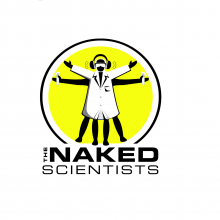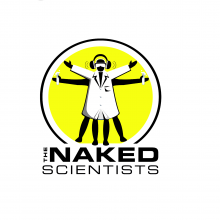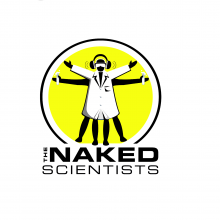Naked Question and Answer and The Life of Benjamin Franklin
Answering all your questions on science, technology and medicine this week are Drs Chris, Dave and Kat, who will be revealing why spicy foods make you sweat, the highest possible temperature, the cause of labyrinthitis and why tissues turn black after receiving frostbite. Also on the show is Mark Skousen, a direct descendent of Benjamin Franklin, who will be talking about the life and work of this famous scientist and statesman; and in Science Update, Bob and Chelsea find some animal magic in the feeding strategies of killer whales and the interpretation of a horse whinny.
In this episode
Step Forward in Parkinson's Disease
Researchers have made a key discovery in understanding the degenerative process underlying Parkinson's disease. The breakthrough hinges on a form of cellular garbage called alpha synuclein, which builds up in brain cells affected by Parkinsons. Antony Cooper, from the University of Missouri and his colleagues have found that the build up blocks the action of a protein, called Ypt1/Rab1, whose role it is to shuttle materials around in cells. Deprived of the function of this essential protein the cells die. But by supplementing the levels of the protein in cells, so it could overcome the effects of the accumulating alpha-synuclein, the researchers found that, in intact flies and worms, and rat brain cells grown in the dish, they could rescue cells previously destined to die. This opens up new avenues for the development of drugs capable of modifying the course of the disease, rather than merely affecting the symptoms, which is the best medicine currently has to offer.
Big Shake Up in San Andreas Due
It's 100 years this year since the great San francisco earthquake that left thousands homeless and caused a conservative 500,000,000 dollars worth of damage. The quake, felt as far away as Oregon, was triggered by a sudden rupture of a 300 mile segment of the northern part of the San Andreas fault. But the southern reaches of the fault have remained intact and continued to accumulate a so-called "slip-deficit". According to Scripps Institution researcher Yuri Fialko, writing in this week's Nature, his measurements from orbiting satellites put the fault at bursting point. It hasn't ruptured in over 300 years and has accumulated a 7 to 10 metre "slip deficit", in other words the amount that it should have moved in that time and hasn't. This suggests that it's set for a shake up, possibly taking LA and San Diego with it, imminently.

Pandas Numbers Up
Contrary to perceived wisdom, panda numbers look at lot rosier than we thought - possibly several thousand of them exist in the wild...
They were once widespread across China and most of southeast Asia. But pressure from humans development has pushed them into just a few environmental corners in the mountainous regions of western China, and scientists thought there might be as few as 1500 left. Since pandas are reclusive and live at a range of altitudes scientists have traditionally counted them by collecting their faeces, which contain pieces of their bamboo diet, and then working out from the bite-sizes in the bamboo how many individuals must be present.
But now a team of researchers led by Cardiff University's Michael Bruford have used a new method to determine panda numbers, also using excrement, but this time by extracting DNA from the faeces and genetically fingerprinting them. Thankfully pandas are fairly prodigious defecators and go up to 40 times per day, so there's plenty of raw material to work with.
The results, published in this month's Current Biology, suggest that there may be 3000 pandas left in the wild, which is many more than expected, and another reassuring finding was that, genetically speaking, the panda population seems very diverse with no signs of a "bottleneck" caused by a population crash.
This is significant because when species numbers drop too low they often succumb to the effects of in-breeding caused by being genetically too similar to each other. However, Bruford cautions that although the numbers of encouraging the panda "is not out of the woods yet" (or the bamboo for that matter) and they still require careful monitoring because their habitat is still threatened.
A Wee Tale of Energy Saving
Scientists at the University of Delft are proposing a new way of taking the proverbial... Currently, urine that goes into sewage systems is very rich in nitrogen and phosphates, which take a lot of energy to remove when the waste is purified. The researchers propose that urine should be collected separately from the rest of our waste, and transported in tankers for local reprocessing. If half the urine in a town could be collected, it would save around a quarter of the costs involved in processing the rest of the sewage. Furthermore, it would mean the sewage smelt less, and pipes won't rot so quickly. Phosphates - an important raw material - could also be extracted from the urine. However, there are still plenty of economic and practical hurdles to be overcome before we are able to successfully take the urine out of everybody.

- Science Update - Whale Feeding and Equine Communication
Science Update - Whale Feeding and Equine Communication
with Chelsea Wald and Bob Hirshon from AAAS, the science society
Kat - We're going to head Stateside now where Bob Hirshon and Chelsea Wald are going to bring us this week's Science Update. They're going to be looking at the feeding tactics in killer whales and learning about equine communication, you guessed it, straight from the horse's mouth.
Bob - For the Naked Scientists this week: a Dr Doolittle for horses, trying to understand the meaning of the whinny. But first, killer whales aren't really whales-they're actually a member of the dolphin family. And they aren't really killers, either, at least not of humans. Chelsea tells us about how some of these misunderstood creatures really get their meals.
Chelsea - These Icelandic killer whales aren't making these sounds for fun-they're using them to hunt their favourite food: herring. That's according to Lee Miller and his colleagues at the University of Southern Denmark, who recorded the sounds. As the killer whales close in on their prey, they smack their tails underwater. The thud stuns the fish. What's more, Miller's team discovered that Icelandic killer whales produce a steady tone just before the tail slap.
Lee - So you always hear like a sound, dooo… [Whale tone] Boom [Whale tail slap] And we think that maybe this sound will cause the fish to get into a tighter ball.
Chelsea - …making it easier for the killer whales to get a meal.
Bob - Thanks, Chelsea. After a well-known American racehorse named Barbaro was injured earlier this year, reporters asked his vet how bad the injury was.
David - And he says, it's very difficult to tell because we can't speak to them and they can't speak to us.
Bob - That's physicist David Browning of the University of Rhode Island. He and a colleague are trying to overcome this language barrier between humans and horses by studying whinnies. His preliminary study shows they are quite varied.
David - The frequency can increase quite rapidly at the start and then taper off slowly. Or you can get this characteristic tremolo, you know, which you get in a whinny.
Bob - He hopes to determine what, if anything, the horses are communicating with this rich repertoire.
Chelsea - Thanks, Bob. Next week we'll talk about an ancient rock carving that might actually be an astronomical record. Until then, I'm Chelsea Wald…
Bob - And I'm Bob Hirshon, for AAAS, the science society. Over to you, Naked Scientists.

- The Life of Benjamin Franklin
The Life of Benjamin Franklin
with Dr Mark Skousen, eighth generation descendent of Benjamin Franklin
Chris - What's your connection to Benjamin Franklin and who was he?
Mark - I am a direct descendent of Ben Franklin. Ben Franklin was the first scientific American. He was a great statesman and on eof our founding fathers and a very successful printer. But his greatest love was science and he was very much a practical inventor. He wasn't into high theory and academia and was an inventor of five or six things. I made a list: the Franklin stove, the lightning rod, bifocals, charting of the Gulf Stream, daylight savings, the armonica.
Chris - How did he come up with that lot? That's a lifetime's achievement to make one of those things. I'm not sure I know what a Franklin stove is by the way, so perhaps you'd better tell me.
Mark - It's basically a box inside a fireplace that allowed the heat to go up and then down and then out. In other words in stayed much longer in the fireplace.
Chris - So more efficient.
Mark - Yes, much more efficient.
Chris - I could use on eof those because in my dining room we've got this big open fireplace and you can burn off a big of coal in it in an evening. It's just a conduit to the sky for the heat because the heat goes straight up the chimney. So I could do with a Franklin stove.
Mark - It wasn't very successful because it leaked a lot so smoke went into the area and it didn't always work that well, but it at least worked in theory.
Kat - I'm staggered by Franklin's achievements in all aspects. Would you class him as a Renaissance man up there with someone like Da Vinci?
Mark - Well there's a book called the 100 most influential people in the world and Franklin is listed there as the most multi-talented genius of all ages. So he's right up there with Da Vinci and others with this broad selection of fame and interests. It's really remarkable.
Kat - And he invented the armonica, which makes him the coolest man on Earth.
Mark - Yes, because it does require water and so forth. I should also mention that he would qualify as one of the first Naked Scientists because he had a theory of colds, and he would walk around in the morning totally naked and have the windows open.
Chris - He was a man hell-bent on self-destruction, wasn't he, with his lightning rods and walking around naked!
Mark - No question that he risked his life many times not only for his country but also as a statesman and also as a scientist with his kite experiment. He also tried to help people who had physical problems. He would electrify them.
Chris - Let's get to the bottom of that. He did what?!
Mark - On several occasions he gave a form of shock therapy which many scientists of that day believed in.
Kat - It also says here that he invented bifocals. Was he short sighted himself?
Chris - Bifocals are for long-sighted people.
Mark - Yes, he had a hard time seeing people at a long distance and also he had a hard time reading. You have to understand that when he invented these he was over 70 years of age. He couldn't make out people, especially in France where he had a hard time with the language. He needed to see what they were saying with their mouth.
Chris - I have that problem and I'm normally sighted.
Mark - With French?
Chris - Yeah with the French.
Dave - Yeah, bifocals are for old people who can't focus on things a long way away. They can't adapt as much so you have two lenses in them: one for far away and one close to you.
Kat - I'm obviously too young to have such a problem.
Chris - Because interestingly, apart from being a scientist, he was up there with turning America into something that wasn't part of Britain, wasn't England anymore and be its own country. And he took some great risks doing that didn't he?
Mark - Yes he did. He hazarded his life and fortune as he often said and others did who signed the Declaration of Independence in 1776. He was also helped to write the constitution of the United States, so he was a political figure, a statesman, a scientist. Even though we won the war, he hated war because it took him away from his number one pursuit, which was his avocation as a scientist. He had many friends whom he lost as a result of the war and so he always said there was no such thing as a good war and no such thing as a bad peace. He also felt the government played a positive role in science and he was around at the time when Mr Mesmer came from Vienna and said you could mesmerise people. He actually exposed that and wrote an article for the French government to expose that. He said the government have a responsibility to expose fads and junk science.
Chris - That's very encouraging. One thing I see here, and I don't believe he was truly American, because it says Franklin did not believe in profiting from his inventions. He never tried to make money on them and never tried to patent or trademark his secrets. He felt inventions belonged to the public for their universal enjoyment. Where has America gone wrong since?
Mark - Well I think that's a universal principle. We westernise everything: intellectual rights, patents, trademarks and so forth. It's not just and American custom. In the Compleated Autobiography, you'll see that he was really a man of wisdom and a very modern person. He would be on the internet today. He would be using cell phones and so forth, while many people are afraid of these things. Not Franklin.
Chris - Now just to finish off, you've given me a wonderful selection of stamps. Are these commemorative stamps?
Mark - Yes they are and I just wanted to point out the US post office couldn't have just one Franklin stamp honouring him. They honour him in four different ways as a statesman, as a printer, as a postmaster and as a scientist.
Chris - He should have his barber honoured as well because he's got fifteen different hairstyles in each of these stamps. Thanks very much for coming in and have a great time here in the UK where you'll be touring with your book. What Mark has done is finish what Benjamin Franklin started.

- Why do spicy foods burn my tongue and make me sweat?
Why do spicy foods burn my tongue and make me sweat?
Chilli has got a molecule in it called capsaicin, and capsaicin locks onto a certain channel on the surface of nerve fibres in the mouth and all over the body that signal pain. When the capsaicin molecule from the chilli locks on tot hat nerve fibre, it activates the nerve. The same nerve fibres also signal temperature, so it fools the nervous system in to thinking that you're hotter than you are. This causes a heat reaction and is why you often get red and sweaty. The reason that water doesn't make it better is because capsicin dissolves in oil and doesn't mix with water. Putting water in doesn't make any difference as it stays locked onto the nerve cell. This is why you often get yogurt or yogurty drinks with spicy food, because they've got fat in them. If you want to get rid of it, you need something with some kind of fat in it. Alcohol will also dissolve capsaicin, so a slug of beer should help it to feel better.

- Why is frostbite black?
Why is frostbite black?
I think it's the same process that makes your skin turn green or black when you get a severe bruise. That's caused by haemoglobin and iron products in your blood oxidising. If an area of skin is very damaged, then it has become dead tissue. All the blood that's left in there will break down in response to the air. When something gets frostbite, you get ice crystals inside the cells. These are very jagged and spiky and pop all the cells in the tissue. So it's not just the surface that gets damaged, it's every bit of tissue inside the frozen area. It's like you hitting your hand with a mallet internally. So it's just a jellified mess inside and all the enzymes on the inside escape to the outside. Some of those are quite nasty and can break things down, but they're usually ok because they're locked away in a safe part of the cell. Once they've escaped, they start degrading tissue. That chews the tissue to pieces and you get this nasty black mess, which are the oxidation products. The iron in your blood goes black because your hand is essentially going rusty.

- How are blood pressure measuring devices (sphygmomanometers) calibrated?
How are blood pressure measuring devices (sphygmomanometers) calibrated?
This is very important because if you were to make an error of 5mmHg, because normal blood pressure is about 120 over 80, then you could diagnose someone with high blood pressure and end up being on treatment. The answer is that they're checked regularly and they are calibrated so everyone knows that they are absolutely right.

- Why does a wet cap upside down on the top of a soda bottle make sounds?
Why does a wet cap upside down on the top of a soda bottle make sounds?
I guess what's happening here is that you've got a half-filled fizzy drink bottle and inside that drink you've got a lot of dissolved carbon dioxide. That will slowly be boiling off and you can see the bubbles coming up all the time. The gas will be escaping through the little gap at the top. If there's nothing sealing that gap, then the air will escape slowly all the time. If you put some water on the lid, then it'll seal it and cause the pressure to build up a bit. The gas will then pop out and reseal again; seal and pop, seal and pop. This is probably what you're hearing.

- Does urinating on impaled sea urchin spines dissolve them?
Does urinating on impaled sea urchin spines dissolve them?
I've had a look around and found that nothing really works for these kinds of stings. Urine is used is used as a folk cure all over the place, basically because it's easily accessible. It's used for anything from bee stings to jellyfish stings. A lot of it may be to do with the placebo effect, but it might also be to do with the fluid washing over the skin relieving some of the pain or washing away any remaining sting particles. If you do get stung, the best thing to do would be to get yourself to hospital.

- Why does grass make pollen?
Why does grass make pollen?
Plants have pollen because they need to sexually reproduce. In the same way that humans make eggs and sperm, in a plant you have a stigma which leads down to the ovary and the plant's equivalent of eggs are, and pollen is like the sperm. Pollen floats around in the air and is carried there by insects as well. They land on the stigma and grow invasively down into the stigma with a pollen tube. The egg is then fertilised and you get a seed forming. The plant spreads that seed so it can make new versions of itself.

- When making squash, does it matter whether the water or concentrate are added first?
When making squash, does it matter whether the water or concentrate are added first?
I'm not at all sure. It might be something to do with the way the two are mixing, but it seems more likely that this is some sort of strange psychological thing. If you mix them unevenly, some bits will be very strong, which your mouth will notice, and other bits will just be water which you'll ignore, so you'll only notice the really strong bits. I suppose it will also make a difference depending on whether you fill it slowly or with a gushing tap. At the end of the day, what is flavour? Well it's a molecule that creates a certain taste response. It shouldn't matter what order they're put into the glass. As long as they're mixed completely then you should get the same flavour.

- What's the highest possible temperature that you can achieve?
What's the highest possible temperature that you can achieve?
There is no highest possible temperature that you can achieve. On a microscopic scale temperature is approximately the amount of energy each atom has. You can have a lowest possible temperature because you can have no energy at all. But you can give as much energy as you like to a particle but it will still just keep getting hotter and hotter. There's no theoretical maximum. There's maximum speed that things can reach, and that's the speed of light. But there's no maximum energy that they can have because at the speed of light, things have an infinite amount of energy.

- What causes labyrinthitis and is there a cure?
What causes labyrinthitis and is there a cure?
The labyrinths are part of your inner ear and there are fluid-filled cavities in the ear. They don't just power your hearing but they power your balance organs as well. When you move your head, the fluid moves a little bit and it moves hairs inside that system. The hairs are connected to nerves, and those nerves signal to the brain which direction your body is moving in. The brain tells the eyes how to compensate and how your muscles should move to compensate for your moving so that you retain your balance. Occasionally things can happen to make that system go awry. There are a whole host of reasons why, but a common cause is the common cold or a viral infection and it can cause quite long term changes to that part of the ear. It can cause you to feel a bit giddy for quite some time, but it does go away eventually if it genuinely is labyrinthitis. There's no magic cure, so you just need to give it time.










Comments
Add a comment